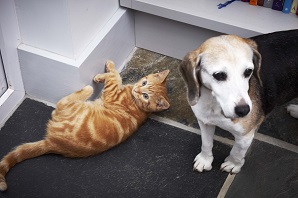Welcome to Petplan’s blog, a space where you can read up on the latest pet-news, find out interesting facts and tips about keeping your pets happy and healthy, and share your views on hot topics.
Refine articles by
clear search- Behaviour problems
- Veterinary problems
- Diet
- TitBits- news and more
- PetPeople magazine archive
- Petplan customer stories
- Travel
- Debates
- Advice
- Petplan feature
- Breed profile
- Health
- Petplan Prize Draw Winner
- Petplan Checklist
- Stories from the surgery
- Petplan Debate
- Charity partnerships
- Awards
- Rehoming
- cat
- dog
- rabbit
- adult
- senior
- puppy
- Lifestyle-sub-category
- Behaviourists-corner
How to make your cat use its scratching post

How to keep your dog's ears healthy

How to worm a difficult cat

Q: Can you tell me any simple way to worm my cat Maude, whether using a tablet or another method? She’s a cantankerous old thing and I find it almost impossible to get a tablet down her without being badly scratched.
A: Tableting is one of the most common difficulties experienced by cat owners. Best undertaken by two people, a cat can be carefully wrapped in a towel to protect all involved from their sharp claws.
Using a plastic tableting instrument bought cheaply from your local vet clinic, tip your cat’s head back so that their nose points to the ceiling, gently opening the mouth before popping the tablet behind the tongue and quickly stroking the throat to encourage swallowing. If this process is impossible with Maude, some treatments in liquid form will kill all forms of intestinal worm commonly found in cats that live in the UK.
Available from your vet, these treatments are applied to the back of the neck like many flea treatments (some of which, incidentally, also treat gut worms), and get absorbed through the skin and into the bloodstream, before killing the worms present in the digestive tract. Used routinely every three months, this spot-on treatment may be the answer to your feline’s internal parasite problems.
Does spaying affect a cat’s coat?

Q: My beautiful Bengal cat Lydia is about six months old and I’m thinking of getting her spayed. The breeder said to be careful where the vet clips her for the surgery, as this could affect the colour of her coat. If this is true, what can I do about it?
A: I have seen this happen in the occasional cat, and I must say I’m not certain why. It is likely that the clippers irritate the skin and cause melanin, the skin’s natural skin pigment, to be produced, or that clipping disrupts the normal cycles of hair growth and moulting, leading to the patch of coat regrowing with a slightly different colour.
With cats such as Bengals, whose coats are prized for being so delicate and beautiful, it’s best to have them spayed via a midline incision over the belly, where any change in coat colour will not be as noticeable. Strangely, this unusual reaction does not seem to happen as much in domestic breeds as in more exotic varieties such as beautiful Lydia, but spaying is a good idea for all cats, so speak to your vet about your concerns before the procedure is completed.
Can I leave a rabbit outdoors over winter?

Q: I usually bring my rabbits indoors around the end of October but, as we have several children and only a small house, we’d ideally like to leave them outdoors next winter. Is this possible?
A: A rabbit would normally shelter by burrowing deep underground but, as that’s not possible for a pet, we need to take other measures to protect them from the long British winter. You could look into the possibility of placing heat lamps in a covered section of the hutch, and using appropriate dry bedding for a winter outdoors.
The hutch should be in a sheltered position and, ideally, off the ground to avoid frosts. Your rabbits must be checked every day, and you may need to bring them indoors if there’s a lot of snow.
Does your dog have weepy eyes?

Q: My five-year-old Springer Spaniel is prone to weepy eyes. Should I take him to a vet or just keep cleaning his eyes with cooled boiled water?
A: If the discharge is clear or brownish in colour, it’s normal tear production – possibly excessive because of irritation or allergy. If the discharge is yellow, it’s a bacterial infection that will need antibiotic medication from your vet.
Many owners report that their dogs have weepy eyes during early spring, possibly associated with the increase in pollens and dust in the atmosphere. A good wipe clean with cooled boiled water would be a perfect way to keep your Springer’s eyes clean and clear, so continue as you are unless infection does become apparent.
My dog's aggressive on walks. What can I do?

How to make your pet allergy a thing of the past

Six simple steps to a balanced diet

Four easy ways to get fit - with your dog's help

Expert research has shown that the average cost of a monthly gym membership is £31*, which works out at £372 a year. So if you want to shed the pounds but keep your bank balance healthy too, exercising with your dog is the perfect solution.We've spoken to personal trainer Mickey Cunningham from Body Studio gym, and he's recommended these fun, effective and low-cost ways to get fit with your dog.


